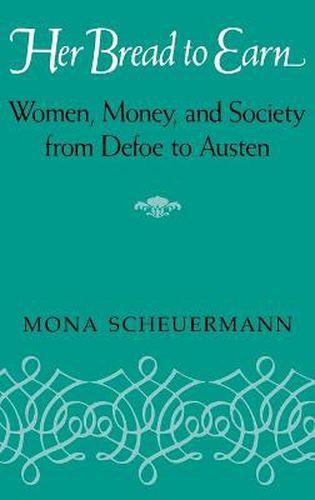Readings Newsletter
Become a Readings Member to make your shopping experience even easier.
Sign in or sign up for free!
You’re not far away from qualifying for FREE standard shipping within Australia
You’ve qualified for FREE standard shipping within Australia
The cart is loading…






Much criticism has posited an all-powerful patriarchy that effectively marginalized and disempowered women until well into the nineteenth century. In a startling revisionist study, Mona Scheuermann refutes these stereotypes, finding that the images presented by eighteenth- and early nineteenth-century novelists are of functioning, capable women whose involvement with the getting, keeping, and investing of money provides a ubiquitous theme in the novels of the period. Her Bread to Earn focuses on the images presented by the major novels of the eighteenth and early nineteenth century, those works that form the core of the canon or that define an important trend at a particular time. Moving through Defoe through Richardson, Fielding, Holcroft, Godwin, Bage, Inchbald, and Wollstonescaft to Austen, Scheuermann demonstrates that novelists of this period depicted women as relatively independent persons, many of whom managed property, shaped and directed events, and controlled their own destinies. These are intelligent women, eager to learn, and ready, sometimes aggressively ready, to act. Scheuermann’s eighteenth-century women is drawn in the grays of reality, not in the black and white of ideology. The images she presents go far beyond the patriarchal prison into which modern criticism has sometimes forced the female characters. Certain to spark controversy, this book marks a major shift in received opinion.
$9.00 standard shipping within Australia
FREE standard shipping within Australia for orders over $100.00
Express & International shipping calculated at checkout
Much criticism has posited an all-powerful patriarchy that effectively marginalized and disempowered women until well into the nineteenth century. In a startling revisionist study, Mona Scheuermann refutes these stereotypes, finding that the images presented by eighteenth- and early nineteenth-century novelists are of functioning, capable women whose involvement with the getting, keeping, and investing of money provides a ubiquitous theme in the novels of the period. Her Bread to Earn focuses on the images presented by the major novels of the eighteenth and early nineteenth century, those works that form the core of the canon or that define an important trend at a particular time. Moving through Defoe through Richardson, Fielding, Holcroft, Godwin, Bage, Inchbald, and Wollstonescaft to Austen, Scheuermann demonstrates that novelists of this period depicted women as relatively independent persons, many of whom managed property, shaped and directed events, and controlled their own destinies. These are intelligent women, eager to learn, and ready, sometimes aggressively ready, to act. Scheuermann’s eighteenth-century women is drawn in the grays of reality, not in the black and white of ideology. The images she presents go far beyond the patriarchal prison into which modern criticism has sometimes forced the female characters. Certain to spark controversy, this book marks a major shift in received opinion.